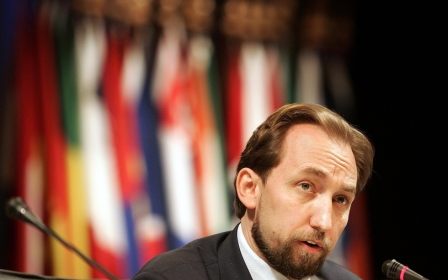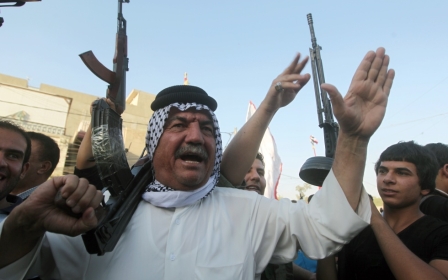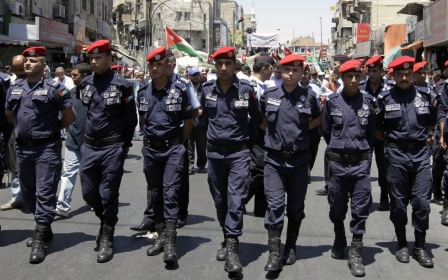Jordan's King Abdullah warns that ISIL has 'no regard for borders'

Jordan's King Abdullah has warned over the growing threat posed by the Islamic State of Iraq and the Levant (ISIL) and called for a comprehensive and inclusive government in Iraq to counter this threat.
“The crisis in Syria has shown us that transnational terrorists have no regard for borders… as well as the challenge we face when those terrorist organisations or those extremists return back to their host countries,” King Abdullah said in Berlin on Tuesday, ahead of his meeting with German Chancellor Angela Merkel.
He also called for a new inclusive government in neighbouring Iraq and said that: “all participants of Iraq should come together in a comprehensive way and begin the building blocks of a totally inclusive future for the Iraqi people.”
“We strive to achieve a solution that includes everyone there for the future of Iraq," he added.
Jordan is alarmed by ISIL’s increased strength in the Sunni-dominated regions of Iraq and the group’s recent advances in the border region. ISIL currently controls various towns along the 180 km long border between Jordan and Iraq, as well as large parts of the Iraqi-Syria border.
An unnamed Jordanian official told news site Arabi21 on Wednesday that Iraq “tribal militants” are now in control of Trebil, the only official border crossing between Iraq and Jordan. According to the source, Jordan reached an agreement with the militants whereby Iraqi officials will be allowed to remain at the crossing to continue their work securing the border, which remains open.
The comments come after the spokesperson for Iraq’s armed forces Qassem Ata asserted that Iraqi forces were in “complete control” of the border, after reports earlier in the day that the army had withdrawn from the area.
German Chancellor Angela Merkel underlined the need for a political solution to counter threats posed by ISIL.
“It is important that in Iraq all religious groups and sections of the society are involved in a dialog and rapidly form a government,” Merkel stressed. “By doing so, the state of Iraq can be strengthened against the fundamentalists and extremists.”
Iraq’s Shiite-led Maliki government has long been criticised for discrimination against other religious and ethnic groups, resulting in alienation of the Sunni and Kurdish populations.
Call for help for Syrian refugees
Merkel and Abdullah also stressed on Tuesday that they will try to ensure stronger support for Syrian refugees in Jordan. According to the UN, around 600,000 Syrian refugees have taken shelter in Jordan.
“We are the third largest refugee host country in the world,” Abdullah said. “It seems unfair that Jordan should bear this major responsibility by ourselves and we are looking to the international community to assist us so that we can continue to be an island of stability in this volatile region.”
According to the UN, around 600,000 Syrian refugees have taken shelter in Jordan.
Support for Israeli-Palestinian talks
The Jordanian king has also raised his expectations on the Middle East peace process, during the joint press conference with Merkel.
“We do hope that there is an opportunity to relaunch negotiations between Israelis and Palestinians,” he said. “And again it is important as we look at Jerusalem, there are no unilateral decisions and provocations for the holy sites in Jerusalem, specifically for the Christian and Muslim holy sites,” he added.
Jordan fears Iraq jihadist fight may spill over
The Sunni militant offensive in Iraq has sparked fears in Amman that they will take the fight to Jordan, which is already struggling with its own home-grown Islamists.
The Islamic State of Iraq and the Levant (ISIL), a powerful extremist group that controls key areas of Syria, has seized a swathe of Iraqi territory.
Experts fear Jordan could be one of ISIL's next targets, with YouTube videos purporting to show the group threatening to take jihad there.
A Jordanian army official said on Wednesday that their armed forces are ready to counter “any aggression” spilling over from violence in Iraq.
His comments came two days after Jordan sent reinforcements including extra troops, tanks and rocket launchers to its north-eastern border with Iraq.
“The army will not tolerate any kind of infiltration”, a security source told AFP.
Already reeling under the impact of hosting more than 600,000 Syrian refugees, Jordan has long faced security challenges in dealing with its own jihadists, many of whom have joined ISIL and other Al-Qaeda-linked groups in Iraq and Syria.
"Only the ignorant or those in denial would think that ISIL does not have supporters in Jordan. How do they explain the presence of 2,000 Jordanian extremists in Syria and Iraq?" Oraib Rantawi, head of Amman's Al-Quds Centre for Political Studies, told AFP.
On Friday, Islamists demonstrated in the restive southern city of Maan, praising ISIL "victories" in Iraq, sources said.
"Jordan needs to worry a lot. ISIL is very organised and strong. The group plans to extend its circle to target and include the kingdom," Hassan Abu Hanieh, an expert on extremist groups, told AFP.
US President Barack Obama has warned the militant offensive could spread
and said in an interview Sunday on CBS television's "Face the Nation":
"That could spill over into some of our allies like Jordan"
One recent YouTube video shows an ISIL fighter tearing up a Jordanian passport.
"I have a message to the tyrant of Jordan: we are coming to you with death and explosive belts," he said.
Jordan's extremist movement is generally dominated by anti-ISIL groups that support al-Qaeda and its Syrian ally al-Nusra Front, ISIL's rival.
Jihadist ideologues and Salafist leaders in the country have joined al-Qaeda chief Ayman al-Zawahiri in denouncing ISIL brutality.
Last week, six suspected ISIL followers attacked Iyad al-Quneibi, an outspoken critic of the group, and smashed his car, highlighting inter-Islamist rivalries.
The university professor, seen as pro-Nusra, did not blame anyone, but Salafist leaders and others pointed the finger at ISIL.
"We are not in touch with ISIL, but there is no doubt it has many backers in Jordan," Mohammad Shalabi, a Jordanian Salafist leader better known as Abu Sayyaf, told AFP from jail.
'Happy when regimes fall'
"We are happy to see the tyrannical regimes in Iraq and Syria fall.
"In Iraq, it is a fight between good and evil, and we pray to God that any issues will vanish, paving the way for the creation of Islamic Caliphate."
Mohammed Abu Rumman, a researcher at the University of Jordan's Centre for Strategic Studies, said ISIL support is growing.
"It is dangerous and this should make the Jordanian authorities concerned," he told AFP.
"These developments impose big security and strategic challenges on Jordan. It is a nightmare."
According to global intelligence firm Stratfor, the ISIL's "intent to expand into Jordan follows the region's geopolitical logic".
"After its push into Iraq, and already controlling significant swathes of Syrian territory, the group can try to push into the kingdom... Jordan is the only opening available to ISIL," Stratfor said on its website.
But ISIL still faces considerable challenges, it added.
"The Jordanian regime is far more stable than Syria or Iraq, and its security forces have proved to be quite effective. Furthermore, Jordan has strong backing from the United States and Saudi Arabia."
Jordan takes such warnings seriously
"The Jordanian army has dispatched more troops, tanks, rocket launchers and armoured personnel carriers to the border with Iraq," a security official told AFP on Monday, after militants have seized the Al-Waleed border post between Iraq and Syria.
In an attempt to counter the influence of Jordanian Al-Qaeda-affiliated extremists fighting in Syria, Amman in April approved a tough anti-terrorism law and arrested scores on their return.
"The key thing to bear in mind is that while it can carry out terrorist attacks in Jordan, there are too many constraints for the group (ISIL) to act in Jordan as it has in Syria and Iraq," Stratfor said.
New MEE newsletter: Jerusalem Dispatch
Sign up to get the latest insights and analysis on Israel-Palestine, alongside Turkey Unpacked and other MEE newsletters
Middle East Eye delivers independent and unrivalled coverage and analysis of the Middle East, North Africa and beyond. To learn more about republishing this content and the associated fees, please fill out this form. More about MEE can be found here.




